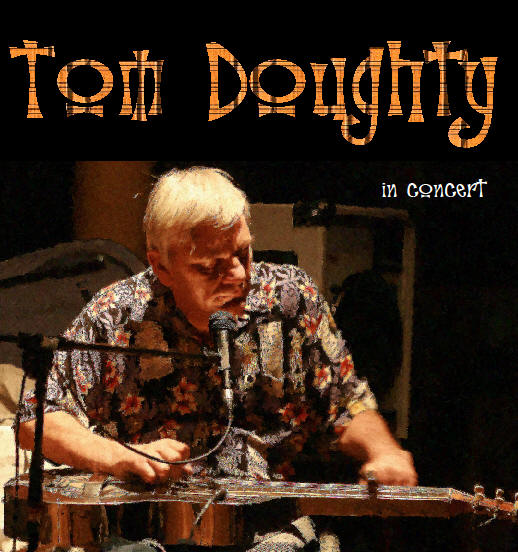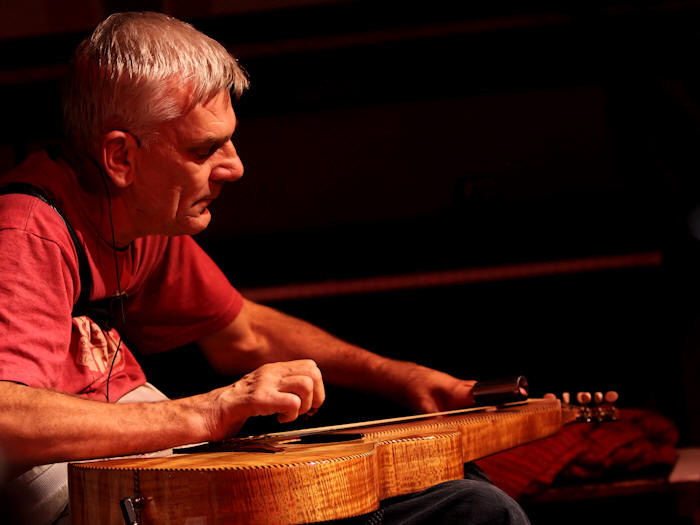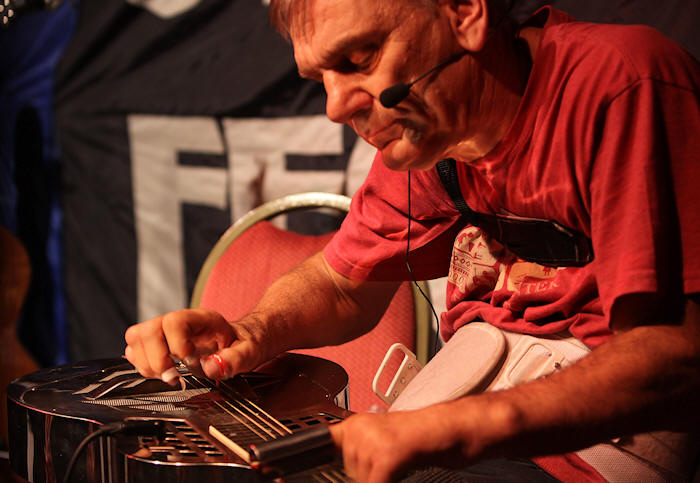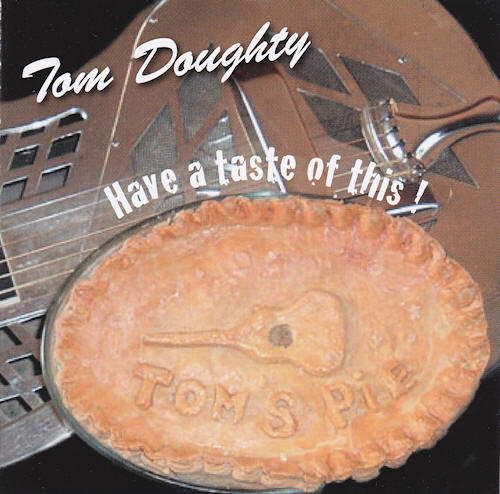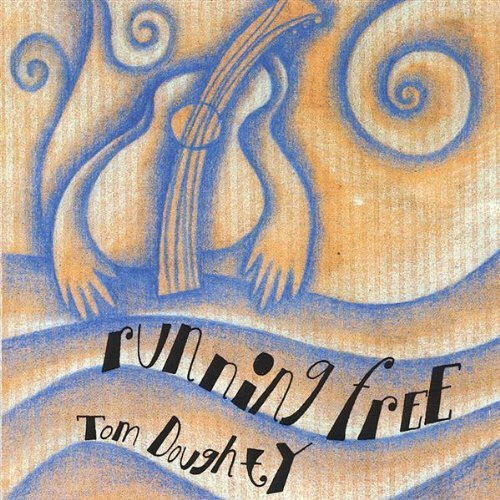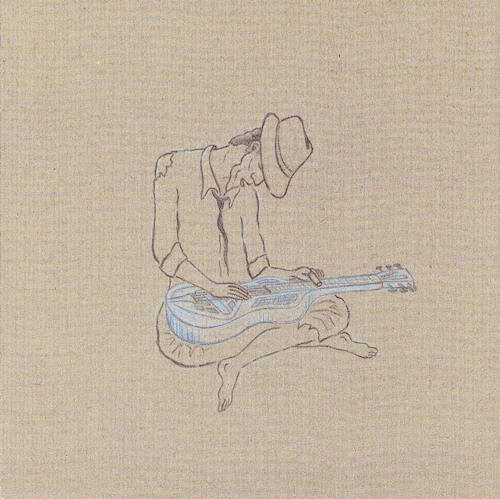
Painting © 2004 Loz
Arkle
Website
© Copyright 2000-2011 Alan White - All
Rights Reserved
Site optimised for Microsoft Internet Explorer
Early Blues Interview
|
|
_________________________________________________________________________
Alan: Where were you born and where did you grow up? Tom: I was born in Frodsham in Cheshire. I was found in a coracle in the River Weaver sitting on top of an old wind-up gramophone that was a playing a Booker White track and smoking a Woodbine. Alan: What were your first musical memories? Tom: Thatíll be the Booker White. Alan: Did you come from a musical family? Tom: Yes, in terms of my father played the mouth organ very badly and really believed he was Larry Adler. But the great thing about my dad was that he was the village blacksmith and he got really into his music in a really great way, and I always think you are influenced by the first things you hear and as 7 or 8 year old I was able to listen to music from Tchaikovsky and opera to Jim Reevesí Bimbo, and everything in between. And in that record collection my father introduced me without ever mentioning it because Sunday morning he put his records on. All the American standards like Cole Porter to Gershwin, through to Son House through to bits of Leadbelly, Woody Guthrie, then German classical music and the pop music of the day so I was brought into this great musical listening family. Iíd wake up some mornings and the number of times the bugger would give me If I Were a Rich Man from Fiddler on the Roof or mom and dad would be singing to South Pacific, even Paint Your Wagon, but the beautiful thing about that era is that even though itís not blues itís about melody and rhythm and the lovely twisty turns and twirls, and I listen to Booker White whoís songs have one chord and one riff but he does start to interfere with both the melody and they rhythm and the patterning and the touch in such a way as to set it apart. Iím not a massive Booker White fan; my music is probably as wide as my fatherís but heís in there. Alan: How did you first get started in music? Tom: I have a brother whoís 9 years older than me and he got into the 60s folk blues revival in a big way and he played guitar, so at the age of 6 he showed me a few chords. He showed me in that old fashioned way. You know, Iím only 55 but how things have changed. We used to learn a piece of music by listening to it, maybe watching somebody play if you were lucky enough because it was never on TV and there were no computers, but by listening to the record and the bit youíd really want to play youíd start by picking up the needle on the record and moving it back to the beginning and playing it again. Chris, my brother, had a lot of things like Woody Guthrie, old blues, Dylan, David Graham, the whole gamut of English and American folk blues revival plus all the modern popular music of the day. Alan: Who are your musical heroes? Tom: There are too many! I canít say I want to copy anyone and I teach quite a lot nowadays and I try to teach people to find their own voice and sound but all of my influences are in there and I hope it comes out sounding like Tom Doughty. Although I write a lot of my own songs I also play loads of old blues material and some new, and it's all heavily influenced by what's around me. Alan: After your injury you spent a lot of time without being able to play so what got you back into being able to play? Tom: Desire. Itís as simple as. Undoubtedly the biggest hurdle in my life was losing the use of my hands. I was a 17 year old finger style guitarist, testosterone-fuelled, adrenalin-junkie kid and I was bound for a fall, and my fall happened to be a spinal injury. That put paid to me walking around and having a sane sort of life but that was quite easy to adjust to. That wasnít a big deal, people make it out to be but it really isnít. 95% of people like me do what I do and get on with it, but for me the biggest hurdle was that I lost the proper function of my hands yet I would play music in my head in silence and couldnít get it into the air. Iíd compose music and Iíd listen to music and Iíd know what was going on but I was an avid listener and not player, and that desire overruled the pain of not being able to do it. So, I started by taking a guitar off the wall and my father, being that blacksmith, managed to give me the genes of inventiveness and resourcefulness and I started to find ways in which the hands Iíve got could make sounds which become more pleasant. 8 out of 10 times it would sound bloody awful, one time it would sound so awful I should have chucked it through the window but on one time out of 10 it sounded like music and that was enough to spur me on. I think thatís true of any musician and I'm very conscious about getting wrapped up in ďHeís a special bloke because he plays a guitar and he doesnít use his hands very well. But you speak to John Williams, speak to the best musician you can find and youíll see that weíre all frustrated by our lack of dexterity. So, I play in a different style but I make music and I now know that Iím playing music because Iíve got a following and recognition internationally by my musical peer group and by audiences that help me recognise that and I love what I'm doing. Itís taken me a long time but I have a unique sound and part of that is coming out of the way I play. What more could we wish for? I donít want to sound like a Robert Johnson look-alike.
Alan: In 1999 you attended a 'life changing' guitar workshop with New York blues, jazz, and American roots guitarist Woody Mann - tell me a little about it. Tom: Iím really glad you asked me that question. A lot of people have pivotal moments in their life, and 1974 I broke my neck, got out of hospital with a disability, got on with life, got a job, got to driving a car and got on with it, and I realised that I could still be a non-conformist and I could still be rebellious by doing normal things because nobody expected me to do normal things like get a girlfriend and drive a car and travel and have a life, so my rebellious streak has managed to resurge by my doing quite normal things, and I got to playing the guitar a bit. But I only played it in the house and I was far too shy and lacking in belief to think that I could play it outdoors. But at the Wirral guitar festival where coincidentally I now play every year, this guy, Woody Mann, had a guitar workshop and I thought, Iím going to bite the bullet here. I've got this guitar tuned in a bit of chord, put this tube on my hand and decided to go. I went to the workshop, fully aware that Iíd be the one who couldnít play regular guitar and couldnít play finger-style guitar and we all introduced ourselves and it came to me and I was at the pivotal point of going, ďErrr, I canít really play. Iíve got this disability and I canít move my handsĒ but I, for once, managed to shut myself up, and I said, ďI play in a different way to you and Iíve turned up here to see what I can learnĒ and that pivotal self-belief was enough for me to stay for the day. Woody Mann, being the consummate professional and a tremendous bloke, said ďDonít worry about it lad, just play the melody line if you can, do what you wantĒ and he introduced people to a straightforward simple blues in D and a couple of other things and I just went, ďYeah, I can do that, and thatĒ and by then Iíd acquired my own ways of playing. We had a tea break and he took me on one side and said, ďYeah, thatís interesting. Can you play this?Ē and he played something and I repeated it. Iím fortunate because I learnt to play by ear and I know I can listen to something and usually get it. Then he said, ďCan you play this? Can you play a bass line in here? Can you play a melody line in there?Ē so I did that and he said, ďI run these international guitar seminars in New York with Bob Brozman. Have you heard of him?Ē I said, ďNo, I havenít heard of him and I hadnít heard of you til today mateĒ and he said ďWill you come?Ē. I basically said, No, I canít do that. Iíve just left a job because Iím tired out and Iím just getting divorced and I couldnít even contemplate it. But he said, ďIf you can get there, Iíd love you to come. I think youíll learn a lot and be able to contribute a lotĒ. So I cobbled together the airfare and through Woodyís self-belief in me and through his sponsorship by companies who supported the initiative, they paid for my place there for the week. So I was stuck in the middle of New York with 60 other musicians of all standards, although the bar was quite high. The tutors were people like John Renbourn, Martin Simpson, Bob Brozman, John Cephas whoís sadly no longer with us, Steve James, Woody Mann, just a tremendous accolade of players, the best in their genre really. I came back from New York and within two months had recorded my first album and it made me realise I was playing the blinking thing and it gave me that confirmation. The first album was released and within 3 months it got me playing live on Radio 2 on Paul Jones show and got regular air play. It was recorded with a massive chunk of spontaneity, not with any clever recording equipment but just an enthusiasm and belief in what I was doing. It has things on it like Charlie Patton tunes, a couple of my own tunes, a bit of Robert Johnson, Skip James, some interesting old tunes in there and it still gets regular listening. Alan: Whoís influenced you most in music writing and playing? Tom: Thereís so many brilliant writers. If I could write one Bob Dylan tune or one Leonard Cohen tune Iíd be happy. I love trying to wrap words around interesting melody lines and shapes. My song Zimbabwe does that, itís well out of the regular but the initial riff came to me as I was playing the guitar with the telly on and the sound turned down playing an almost Marc Bolan/T-Rex tune, similar to Jeepster, and that gave me the basis of that first picking rhythm. Alan: You play a wide range of songs and styles, are there any songs that have special meaning to you? Tom: Thereís loads, yes. And some of them are my own. Thereís a song called Something Ainít Right which I really enjoy playing, a song Running Free and thereís also special meaning in Zimbabwe. But youíre right, my music is very firmly rooted in blues and I could play it all day long but I think we move too much in categorisations and I move into old standards, Beatles songs, old standards I was brought up on. I donít think thereís anything that canít be played on lap slide guitar. Alan: You teach slide guitar too. Tom: I do teach it and Iíd like to think it would now be my instrument of choice. Iíve entered this black hole of minutiae where I look at finding variation in pitch and tone and I spent a bit of time studying with an Indian slide guitar guru and itís a really fascinating instrument. Alan: Whatís your approach to budding guitarists when you do your teaching? Tom: Itís all based around finding out what they want to play for, is it to play in a band, to play as a solo player, to play at home for yourself and I like to find out whatís motivating them to be there. Itís not music exams like it is with children, and then I help people find their own voice and sounds. Alan: Your last album was released in 2008. Any future albums in the pipeline. Tom: Iíve got the material for at least another two albums but havenít really got the recording facility at the moment. Iíve just recorded two of my own tracks with a band in Brighton. Itís a guy called Nick Boyes who plays bass at Scarborough Blues Club and is a wonderfully subtle player, and a percussionist from London and we got together in a studio in Brighton and recorded in the old style, live, two of my own tracks, Journey Blues and I Canít See Your Face. So itís based around my music and Iím in the front of it, but adding that depth of the soft subtle bass playing and a full drum kit has really enhanced some of the ideas Iíve got. Thatíll be released early 2013 as an EP and if the response is good then thereíll be a full album to follow it. (Providing I can find a way of paying for it, but thatís a side issue!). Iíve got mixes so far, not masters, and in Journey Blues thereís a lead break in the middle where this Hammond organ just gently rises out of the ashes and gives me this lovely superb resonant sound in the background to allow me on the lap slide to just whizz off on the lead break. Iím really proud of what Iíve heard so far. Alan: Iíll look out for that in 2013 and meanwhile Tom thanks so much for your time. _________________________________________________________________________
Have a Taste of This / Tom Doughty
"Exploiting overtones that many lap style
guitarists try hard to suppress, Tom delivers a musical complexity,
depth of tone and raw emotion that lesser mortals merely dream of".
Running Free / Tom Doughty
"This is a gorgeous CD full of imaginative
performances played by a peerless virtuoso of the slide guitar. Another
of our home grown treasures, Tom Doughty is certainly a rare talent. Do
yourself a favour and get this now! Just superb".
The Bell / Tom Doughty "This is quite simply one of the finest acoustic guitar albums I have heard for a while. Rating: 10/10" Michael Prince, Blues in Britain
All albums available from: _________________________________________________________________________
Return to
Blues Interviews List |








